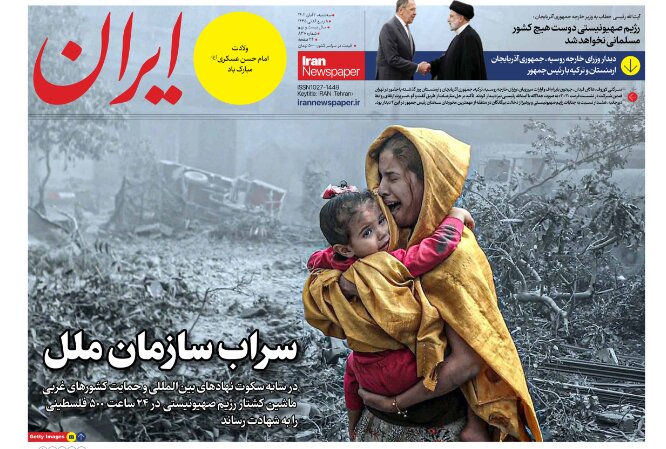Peace, cooperation and progress in South Caucasus

The Iran newspaper analyzed the 3+3 format meeting hosted by Tehran with the foreign ministers of Iran, Russia, Turkey, Azerbaijan and Armenia and wrote: This meeting was held as the Gaza Strip is burning in the fires of Tel Aviv's brutal actions.
While using its utmost diplomacy and pressure to bring an immediate end to the Gaza onslaught, Iran has gathered four foreign ministers in Tehran to address the ongoing crisis in the South Caucasus and discuss the process of peace negotiations in the region. Amir Abdollahian has called this one-day meeting "the turn of peace, cooperation and progress in the South Caucasus" as the cornerstone of the path to establishing peace and ending security challenges in the South Caucasus with the participation of regional actors and neighbors. The purpose of this meeting is to use the capacities of the region to solve regional issues and to make a collective effort to establish peace and cooperation for economic development and improve the welfare of the people of the region.
Kayhan: Current situation in Middle East in complete contrast to the normalization process
In a note, Kayhan investigated the war between Hamas and the Zionist regime and the issue of Iran from the point of view of Colin P. Clarke, the senior researcher of the Soufan Center, an intelligence and security consulting company. The paper said: Iran is at the center of the growing tensions in Gaza, which has been engaged in a shadow war with its main regional rival, Israel, for years. Iran's proxy war tactics have been successful. Hamas and Hezbollah have inflicted serious damage on Israel and sent a clear message to Tel Aviv that if Tehran chooses, it can launch an asymmetrical war that combines conventional and unconventional military capabilities. The New York Times claims that many Middle East observers believe that the motive behind the Hamas attack was a necessity - both from the viewpoint of the Hamas leadership and Tehran - to derail a normalization agreement between Israel and Saudi Arabia. Currently, any normalization talks between Saudi Arabia and Israel are suspended.
Shargh: The cautious strategy of Iran and America
Shargh devoted its editorial to the draft of the American resolution on the Gaza crisis. It wrote: It seems that Israel's attacks against Gaza have caused important movements in the relations between Iran and the United States. In the draft resolution that the United States has submitted to the Security Council regarding the Gaza crisis, Iran has been asked to stop exporting weapons to "militia and terrorist groups that threaten peace in the region". The American draft is both a diplomatic invasion against Iran and in line with the American priority of leaving Israel's hand open to continue the attack on Gaza and pursue the declared goal of "destroying Hamas". America's actions, which are aimed at Iran and Iran's allies, have created new conditions for the understandings that were said to have been reached between Iran and America, and part of it is related to establishing peace in the region. In recent months, Iran and America have rarely taken any action against each other's goals in the region. However, it is hoped that America's need to maintain peace on the one hand and Iran's restraint on the other will prevent the crisis from increasing and spreading to Iran.
Hamshahri: America's new claim against Iran
In a commentary, Hamshahri discussed the new U.S. claim against Iran and said: The U.S. National Security Council's strategic communications coordinator made claims against Iran's role in the recent attacks on Washington's military bases in the region and the expansion of fronts in the Gaza war. This accusation against Iran is being made as the U.S. has sent a group of military advisers to the occupied territories to continue supporting this regime in the Gaza war. John Kirby, the strategic communications coordinator of the White House National Security Council, claims that Iran continues to support Hamas and Hezbollah, and we know that Iran is closely monitoring these events and, in some cases, actively facilitating these attacks and targeting others who may want to take advantage of this conflict for their own or Iran's benefit. Meanwhile, Hossein Amir Abdollahian, the Minister of Foreign Affairs of Iran, recently emphasized in a television interview that the Islamic Republic of Iran has never welcomed war. Our efforts are focused on realizing the rights of the Palestinians and not spreading the war.
